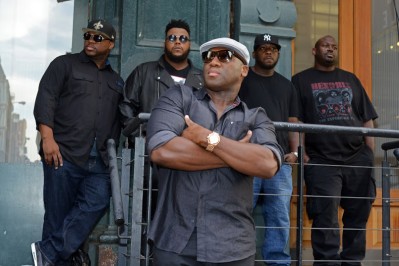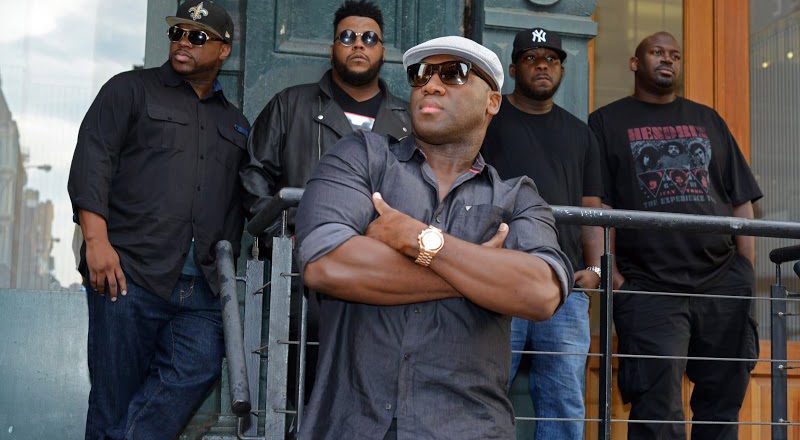INTERVIEW: Big Sam presides over his Funky Nation

Big Sam Williams, the New Orleans trombonist and bandleader of Big Sam’s Funky Nation, has a focused mission in 2016: He wants to grow his fan base. His funky band, which is a festival favorite and common presence in more intimate venues around the nation, is a tried-and-true ambassador of NOLA funk. The band members bring their funk to places far from the Crescent City, and the responses have been effusively positive and resoundingly electric.
Big Sam’s Funky Nation is here to stay.
“A lot of people like mainstream things that’s on the radio,” Williams said recently in a phone interview. “But the funk scene is like definitely still going, and we’re just trying to put our stamp on that. … Whatever you witnessed last time, expect that again but 10 times better.”
That’s a powerful guarantee, but Williams has the credibility factor on his side. He was born and raised in New Orleans, and, despite traveling the world, he still cites the influential Louisiana city as his “favorite place in the world.”
“But, you know, as much as I love home, whenever I’m home for like more than two weeks … which is rare, I kind of sit back and I’m like, man, what the hell am I doing?” he said. “I might have a couple of studio sessions, or writing sessions or whatever, but after sitting home for two weeks, I’m kind of like, I’ve got to get back out on the road. What am I doing? As much as I love New Orleans, I love going out on the road, and performing and making people happy, man.”
The gratification that Williams receives on the road can mostly be evidenced from smiles on people’s faces. Audiences in Pittsburgh; Washington, D.C.; Ardmore, Pa.; and New York City should get ready to smile because the Funky Nation has tour dates in their local area in the next few days. The band will also play a special nighttime set at Michael Arnone’s Crawfish Fest in Augusta, N.J., in June.
“Everybody’s dancing, so that really like brings joy to my heart that I bring joy to their hearts as well,” he said. “So that’s cool.”
Williams sticks to a set list for most concerts, but he enjoys sprinkling in some improv with the solos. A 16-bar solo can often stretch to a 64-bar solo. “And we might just end up vibing with each other just because we’re musicians,” he said. “We don’t just play exactly what’s there or what we know. Sometimes … you want to go outside the box and have fun when you’re on stage, and the crowd can feel that. They can sense it, and they enjoy it as well.”
Williams began playing the trombone in middle school because, he said, nobody else wanted to play the instrument. “I was always a big guy for my age,” he said. “I was playing basketball, and then it got to a point where they were like, you know, you were too tall. They told me I was too tall and too big to play for Little League. … So I decided to join the marching band, and the band leader asked me what I wanted to play. And I just told him whatever you needed somebody on. He was like, ‘The trombone.’ I was like, ‘What’s that?’ He was like, ‘Oh, it’s this.’ So I went home, and I tried to get a sound out of it.”
His first tune was “Wild Thing,” and from then on, he developed a love for the instrument. Williams’ mother was “very supportive” in the early years. She told him that if he wanted to play he needed to take the craft seriously. Williams eventually learned how to read music, and by the second year of middle school, he was section leader in the marching band.
“By that time I realized, hey, I kind of know what I’m doing on this,” he said. “But it wasn’t until high school band, when I was about 15, where I decided to take it to another level, and that’s when I got into jazz. And my mom bought me a Dirty Dozen Brass Band album called ‘Ears to the Wall,’ and that album was like Dirty Dozen’s first funk band with an electric bass, and keys and full drum kit. And I really took a liking to the band, and I loved their music. And I was like, man, you know what, one day I’m going to play with this group, or I’m going to have my own group like it. And four years later from that day, I joined Dirty Dozen Brass Band.”
Williams characterized the music industry as 90 percent business and 10 percent luck. He was in the right time at the right place for entry into one of the most popular and storied brass bands in New Orleans, a city that pumps out many brass bands.
Here’s how the story goes: Williams attended a sweet 16 birthday party of a friend. He was hanging out at her house, and he saw CDs for Billie Holiday, Miles Davis, Jon Coltrane, Charlie Parker, Freddie Hubbard and Louis Armstrong. He was clearly in a musical household. When he asked his friend if she was into jazz, the answer was “no,” but her father sure was.
It turns out his friend was the daughter of a trumpeter with the Dirty Dozen Brass Band. “I got excited,” he said. “I was like, ‘Oh, Lord, where is he?’ He just happened to be in town.”
He told the band members if they ever needed a trombone player, he was their man. At the time, Williams was playing around New Orleans in different brass bands. He helped start Little Stooges Brass Band, an outfit that continues to this day with Walter Ramsey.
“Outside Little Stooges, I was playing with Soul Rebels,” he said. “And I was playing at church. We all went to the same church, so then four years later, after meeting at the house, I was working at Jazzland, which was like Six Flags here in New Orleans. It’s closed out now, and I was working there playing music. I get the phone call.
‘Hey, dude, what’s happening?’
‘It’s ET, man, what’s happening?’
I said, ‘Hey, man, what’s happening?’
He said, ‘Hey, dude, you ready for the road?’
I said, ‘Yeah, man — yeah, yeah, let’s do it.’
He said, ‘All right, dude.’
I said, ‘When are we leaving?’
He said, ‘Tomorrow.’
I said, ‘Whoa. … How long we gone for?’
He said, ‘Three months.’
I said, ‘Oh, let me call my mom and make sure it’s OK [laughs].’
“So I did that, and the rest is history. And that’s how I got into the band, just from knowing the trumpet player’s daughter, you know. They heard about me around the city, but they never had the chance to check me out. But I got on the gig, and they loved what I was bringing to the table. So they kept me around.”
Williams’ stint with Dirty Dozen Brass Band was memorable, but it didn’t last forever. He joined the band in 2000, and then he started Funky Nation in 2001 as a side project. However, he eventually earned a regular gig with Funky Nation in New Orleans every Sunday. Sometimes, when he was on the road with Dirty Dozen, he would have his band perform without him. People would ask: Where’s Big Sam? Who is Big Sam? When is Big Sam going to show up?
“So I started the band in 2001, and I was never home,” he said. “So I would only make like 15 shows a year maybe with my own group. … I can’t like stick around with Dirty Dozen. So what does that mean? I have to take a huge pay cut because that’s my … income, and I just got to fend for myself and figure everything out. So, you know, thankfully everything worked out, you know. It was definitely a hard decision, just because they were the reason that I got into jazz. Those were my idols and still are. They’re great, so to have the opportunity to play with them was amazing.”
Nowadays, Big Sam’s Funky Nation plays festivals, including the New Orleans Jazz & Heritage Festival and Gathering of the Vibes, to reach a broader audience and intimate venues to “get closer to the fans.”
“At festivals, it’s a little bit harder to really feel the vibe from everybody, especially when they have the area in front of you barricaded to the VIP,” he said. “The real fans are way back behind the barricades, so festivals just because you get maximum exposure, but clubs because they are more intimate. And you can really feel the vibe. … If I make a spin, all the sweat goes flying off my face and falls, so it’s cool in the club.”
Williams, the consummate performer, seems to be in a good place musically. “I mean I can’t imagine myself doing anything else,” he said. “I really love performing. I love traveling. I can’t see myself doing anything else.”
By John Soltes / Publisher / John@HollywoodSoapbox.com
- Big Sam’s Funky Nation has tour dates in Pittsburgh; Washington, D.C.; Ardmore, Pa.; and New York City, among other cities. Click here for more information.


Truly the best live show on Planet Earth!